The Iliad (Penguin Classics) Read online
Page 38
APOLLO routs the Greeks
The Trojans advanced in a mass and Hector led them, striding confidently forward. In front of him, with a mist round his shoulders, went Phoebus Apollo, holding the lively aegis, grimly resplendent (310) with its fringe, the very aegis that the bronzesmith Hephaestus had given to Zeus to strike panic into men. With this in his hand, Apollo led the Trojan army.
But the Greeks awaited them in mass formation. A deafening roar went up from either side, and arrows leapt from the string. Many spears launched from strong arms landed in young warriors’ bodies, while many others fell short before they could enjoy white flesh and stuck in the earth, thirsting to take their fill.
As long as Phoebus Apollo kept the aegis steady in his hands, volley and counter-volley found their mark and men kept falling. (320) But the moment came when, looking the Greeks full in the face, he shook the aegis at them and gave a great shout. Then their hearts were bewildered, and all the fight went out of them. As two wild animals stampede a herd of cows or some great flock of sheep in the depths of the dark night, emerging all of a sudden when the herdsman is not there, so the demoralized Greeks were routed. It was Apollo himself who had unleashed panic among them and gave the Hector and his Trojans the glory.
Trojans kill eight Greeks
Having broken the Greek ranks, the Trojans began to pick off the Greeks one by one. Hector killed Arcesilaus and Stichius, one a leader of the bronze- (330) armoured Boeotians and the other a loyal follower of greathearted Menestheus. Meanwhile Aeneas slew Medon and Iasus. Medon was an illegitimate son of godlike Oïleus and so a brother of Ajax; but he lived in Phylace a long way from the land of his fathers, because he had killed a kinsman of his step-mother Eriopis, Oïleus’ wife. Iasus was one of the Athenian leaders and his father was Sphelus. Polydamas killed Mecisteus; Polites (340) killed Echion in the front line; and godlike Agenor slew Clonius. Deiochus, as he joined the other front ranks in their flight, was hit from behind at the base of the shoulder by Paris, whose bronze spear passed clean through him.
While the victors were stripping the dead men of their arms, the Greeks, dashing in panic this way and that and entangled in their own ditch and palisade, were forced to take refuge behind the wall. Seeing this, Hector called out to the Trojans in a loud voice:
‘On to the Greek ships! Forget about seizing the bloodstained armour! Any straggler I see, anyone who does not follow me (350) there, I’ll put to death on the spot. What’s more, he’ll get no funeral from his relatives and womenfolk. The dogs will tear his body in front of Ilium.’
With these words, and swinging his arm right back, he whipped on his horses and sent a great cry across the Trojan ranks. His charioteers to a man gave an answering shout and with a mighty roar drove on their horses and chariots.
APOLLO kicks down the Greek defences
In front of them Phoebus Apollo easily kicked in the banks of the deep ditch and piled them into the middle, making a broad and ample causeway, wide as the distance a man throws a spear when he is testing his strength. Here they poured across rank (360) after rank, led by Apollo, holding up his precious aegis. Then, with equal ease, the god knocked down the Greek wall, as a boy at the seaside knocks down a sandcastle: he builds it to amuse himself, as children do, and then with his hands and feet wrecks the whole thing for fun – so you, Apollo, wrecked the Greeks’ arduous efforts and sowed panic among them.
The Greeks did not stop till they reached the ships. There they halted, calling to one another for help, and every man lifted up his hands and poured out prayers to all the gods, none more (370) fervently than Gerenian Nestor, guardian of the Greeks, who stretched out his arms to the starry sky:
‘Father Zeus, if ever any of us back in Greece with its rich cornfields burnt you the fat thigh of an ox or sheep as he prayed for a safe return, and you promised it to him with a nod of your head, remember that moment now, Olympian; save us from this day of death; and don’t let the Trojans overwhelm the Greeks so completely.’
So he spoke in prayer, and Zeus wise in counsel thundered loud when he heard the prayer of the ancient son of Neleus.
(390) But when the Trojans heard the thunderclap of Zeus who (380) drives the storm-cloud, they fell on the Greeks more fiercely than ever, their will to fight renewed. As a great roller on the high seas tumbles over the sides of a ship when a storm whips up the waves and drives them on, so with a roar the Trojans swept across the wall, lashing their horses on. In a moment they were fighting hand to hand by the ships, the Trojans from their chariots with their curved spears, and the Greeks from high up on the black sterns where they had climbed, with the great pikes – built up in sections and tipped with bronze – which they kept on board for fights at sea.
Patroclus leaves Eurypylus (11.843)
Now Patroclus, so long as the Greeks and Trojans were fighting for control of the wall and were some way from the ships, sat with amiable Eurypylus in his hut and, while entertaining him with his talk, applied herbs to his ugly wound to soothe away the pain. But when he saw the Trojans swarming across the wall and heard the Greeks yelling and panicking, he gave a groan, slapped his thighs with the flat of his hands and said in his distress:
‘Eurypylus, I can’t stay here with you any longer, however (400) much you need me. It’s critical out there. Your attendant must look after you while I hurry back to Achilles and do my best to make him fight. Who knows? With some divine help, my suggestions might stir him to change his mind. A friend’s advice is often the most effective.’
Even as he spoke, his feet were on the move.
Meanwhile the Greeks resolutely resisted the oncoming Trojans but, though they outnumbered them, were unable to drive them back from the ships. Nor, for their part, were the Trojans able to break the Greek lines and get through to their ships and (410) camp. As a string stretched along a ship’s timber enables a skilful carpenter who has mastered his trade under the guidance of Athene to draw a straight line, so battle was pulled tight, neither front line yielding an inch.
Ajax vs. Hector;Caletor killed
While parties of his men attacked at other ships, Hector made straight for illustrious Ajax and the two of them fought it out over the one vessel. Hector could not drive Ajax off it and set it on fire, and Ajax was equally unable to repel Hector once the god had brought him (420) to the spot. Then glorious Ajax hit Caletor in the chest with a spear as he was carrying fire to the ship. Caletor thudded to the ground, and the brand dropped from his grip. Hector, seeing his cousin fall in the dust in front of the black ship, called out to the Trojans and Lycians in a loud voice:
‘Trojans, Lycians and you Dardanians that like your fighting hand to hand, don’t yield an inch in this narrow space we are in! Caletor’s been killed in action round the ships! Rescue him, or the Greeks will have his armour off him!’
(430) (Lycophron and Cleitus killed) With these words he flung a glittering spear at Ajax, but missing him, he struck Lycophron from Cythera, Ajax’s attendant, who had come to live with him after killing a man in sacred Cythera. Lycophron was standing by Ajax when Hector’s sharp bronze spear struck him on the head above the ear. He tumbled backwards from the ship’s stern to the ground and crumpled up in the dust. Ajax shuddered and called to his brother:
‘Dear Teucer, we’ve lost our faithful friend Lycophron, who came from Cythera to live with us; and we thought as much of (440) him as we did of our own parents. Great-hearted Hector has just killed him. Where are your deadly arrows and the bow you had from Phoebus Apollo?’
So he spoke, and Teucer understood him and, running to his side with his curved bow and full quiver, began at once to direct his arrows at the Trojans. The first man he hit was Cleitus, an attendant to noble Polydamas. Teucer hit him with the reins in his hands. He was in trouble with his horses, having driven them into the thick of the foot-soldiers where the fighting was at its most confused, with the idea of doing Hector and the Trojans a (450) good turn. He met disaster at once from which no one coul
d save him, though they would have wanted to. The fatal arrow struck him in the back of the neck and brought him crashing down from his chariot. His horses shied and ran away, with the empty chariot rattling off behind them, till lord Polydamas, who had been the first to notice what had happened, intercepted them. He handed them over to Astynous and urgently told the man to watch his movements and keep the horses close at hand. Then he went and engaged once more with the front ranks.
Teucer aimed his next arrow at bronze-armoured Hector. He (460) would have put an end to the battle by the Greek ships had he struck and killed Hector in the hour of his glory. But Zeus, who is too wary to be caught, was looking after Hector and had kept an eye on Teucer. He robbed him of his triumph by snapping the twisted string of his trusty bow as he was taking aim at his man. The bronze-weighted arrow swerved off-course and the bow fell from his hand. Teucer shivered and said to his brother Ajax:
Teucer abandons his broken bow
’Damn! Some evil power is thwarting everything we try in battle today! It has knocked the bow out of my hand and broken the fresh string I bound on this morning to take the strain of my leaping arrows.’
(470) Great Ajax son of Telamon replied:
‘Well, old friend, abandon your bow and all those arrows, now that some god with a grudge against the Greeks has made them of no use. Pick up a spear instead, sling a shield over your shoulder and so meet the enemy – and give a lead to the rest of our men. Let’s call up our will to fight and, even if the Trojans defeat us, make them pay heavily for our ships.’
So he spoke, and Teucer laid his bow down in his hut and (480) slung a shield of fourfold leather on his shoulder. On his mighty head he placed a well-made helmet with a horsehair crest, the plume nodding frighteningly from the top. Then he took up a powerful spear tipped with sharp bronze and, setting out at a run, was soon at Ajax’s side.
When Hector saw Teucer’s weapons were out of commission, he called out to the Trojans and Lycians in a loud voice:
Hector and Ajax rally their sides
’Trojans, Lycians, and you Dardanians that like your fighting hand to hand, be men, my comrades, and call up that fighting spirit of yours here by the hollow ships! I saw with my own eyes how one of their best men was stopped by Zeus from shooting any more. (490) There is no mistaking help from Zeus. He makes it plain, both to the side for whom he is planning victory and to those he is weakening and refusing to help. See how he is weakening Greek resistance and supporting us! Mass together, then, and attack the ships. If anyone is hit or stabbed and meets his fated end, so be it. He will have fallen for his country, and that’s no dishonourable death. He will leave his wife and children safe for the future and his house and land secure, once these Greeks have sailed back to the land of their fathers.’
(500) So Hector spoke and put fresh heart and courage into every man. Ajax on his side immediately called out to his followers:
‘Shame on you, Greeks! Today we have no choice but to perish here or save the ships and live. Or do you think you’ll all get home on foot if Hector of the flashing helmet takes the ships? He is desperate to set them on fire – can’t you hear him driving his whole army on? And believe me, he’s not inviting them to a dance but to fight. Our only hope, our only strategy, is to face (510) them in battle, hand to hand, and man to man. Whether we live or die, it’s better to settle the matter once and for all than let a weaker enemy squeeze the life out of us in the heat of the battle by the ships.’
Otus and Croesmus killed
So Ajax spoke and put fresh heart and courage into every man. Now Hector killed Schedius, a Phocian chieftain; Ajax killed noble Laodamas, an infantry commander; and Polydamas slew Otus from Cyllene, a leader of the great-hearted Eleans and a friend of Meges. (520) Meges, when he saw this, leapt at Polydamas, but Polydamas avoided his attack by recoiling – Apollo was not going to let him fall in the front line – and Meges missed.
Meges then stabbed Croesmus full in the chest with his spear. Croesmus thudded to the ground, and Meges began to strip the armour from his shoulders. But as he did so, he was assaulted by Dolops who was an expert with the spear. This man was a son of Lampus – the best son he had and a practised fighter -and grandson of Laomedon. Attacking at close range, Dolops pierced the centre of Meges’ shield with his spear. But Meges (530) was well served by the stout body-armour he was wearing, with its metal plates. His father Phyleus had brought this armour from Ephyre and the River Selleïs, where his host, Euphetes lord of men, had made him a gift of it to wear when he went to war and protect him from his enemies. Now it also saved his son from destruction.
Dolops killed
Meges stabbed with his sharp-pointed spear at the plumed crown of Dolops’ bronze helmet and sheared the horsehair crest clean off the top. The whole ornament, resplendent in its fresh purple dye, fell in the dust. But Dolops did not despair of winning; he stood his ground and fought on. What (540) he did not notice was that warlike Menelaus, spear in hand, had come to Meges’ help and crept up on his flank. Menelaus hit him in the shoulder from behind, and the eager spear-point forced its way through and came out at his chest. Dolops fell headlong, and Menelaus and Meges rushed in to strip the bronze armour from his shoulders.
Hector called on all his relatives to rally and singled out mighty Melanippus for rebuke. This man, before the invasion, had lived at Percote where he grazed his shambling cattle. But when the Greeks arrived in their rolling ships, he returned to (550) Ilium, distinguished himself among the Trojans and lived with Priam who treated him like one of his own children. Hector shouted angrily at him:
Hector and Ajax rally men
‘Melanippus, are we to take things lying down like this? Is it nothing to you that they have killed your cousin Dolops? Or don’t you see them helping themselves to his armour? Come with me now. We can’t grapple at long range with these Greeks any longer – either we destroy them or they destroy lofty Ilium from top to bottom and slaughter all our people.’
With these words Hector led the way, and godlike Melanippus went with him.
(560) Meanwhile great Ajax son of Telamon was stirring up the Greeks:
‘Fellow warriors, be men, think of your reputations, and in the heat of battle fear nothing but dishonour in each other’s eyes! When warriors fear disgrace, then more are saved than killed. There is no honour or safety to be found in flight.’
So he spoke, and though they scarcely needed this encouragement to defend themselves, the Greeks took his words to heart and ringed their ships with a fence of bronze. But Zeus still urged the Trojans to attack.
Menelaus, master of the battle-cry, then spurred on Anti-lochus:
‘We have nobody younger than you, Antilochus, and no one (570) quicker on his feet or bolder in a fight. Why not race out and see if you can bring a Trojan down?’
Antilochus kills Melanippus
With these words Menelaus withdrew but he had inspired Antilochus. He leapt out from the front line and, looking carefully round, let fly with his glittering spear. The Trojans leapt back when they saw it coming. But his spear did not leave his hand for nothing. He caught proud Melanippus beside the nipple on his chest as he was advancing into battle. Melanippus thudded to the ground, and night enveloped his eyes. Antilochus pounced on him like a (580) hound leaping on a stricken fawn that a huntsman has killed and brought down with a lucky shot as it started from its lair. So, Melanippus, did resolute Antilochus leap at you to strip you of your arms.
But godlike Hector, who had seen what he had done, came running up through the mêlée to confront him; and Antilochus, brisk fighter though he was, did not await his arrival. He ran for it like a wild beast that has done wrong in killing a dog or herdsman and takes to its heels before a crowd is put together to chase it. So Nestor’s son Antilochus fled, pursued by deafen (590) ing cries and a hail of deadly missiles from the Trojans and Hector. But he turned and stood his ground when he reached his own contingent.
ZEUS spurs Hector on (15.58)
The Trojans now stormed the ships like flesh-eating lions, fulfilling the orders of Zeus who filled them with tremendous energy and bewildered the spirits of the Greeks by denying them all success and encouraging their enemies. He was planning to give Hector the glory, so that he could hurl unquenchable fire on the beaked ships and satisfy all the unreasonable demands of Thetis: Zeus (600) wise in counsel was waiting to see the blaze of a ship on fire. From that moment, he intended the Trojans to be thrust back from the ships and the Greeks to be victorious. All this was in his mind as he spurred on Hector son of Priam to attack the hollow ships.
Not that Hector lacked determination. He raged like Ares the spear-wielding War-god, or like destructive fire in the thickets of a deep forest in the mountains. There was foam on his mouth; his eyes flashed under lowering brows; and his helmet swayed (610) menacingly on his temples as he fought. Zeus himself was Hector’s ally in the sky, selecting him alone from that great crowd of men for honour and glory, since he had but a short time to live. Pallas Athene was already speeding on the day when he should fall to Achilles, mighty son of Peleus.
Hector’s aim was to break the enemy line and, wherever he saw the greatest numbers and best-armed men, he put it to the test. But he failed to break through, for all the ferocity of his assault. Packed as tight as the stones in a wall, the Greeks held (620) firm like a great sheer cliff that faces the grey sea and resists the onslaught of the howling winds and vast waves roaring on at it; so resolutely did the Greeks stand up to the Trojans and never turn to flight.
(630) At last, his fiery armour blazing all round him, Hector burst into their midst. He fell on them as a great tossing wave, whipped up by the winds and the clouds, breaks against a ship; she is completely hidden by the spray; the terrifying blast of the wind howls in her sail; and the crew, shocked and panicking, are saved from destruction by a hair’s breadth – so Greek morale was utterly shattered.

 The Odyssey
The Odyssey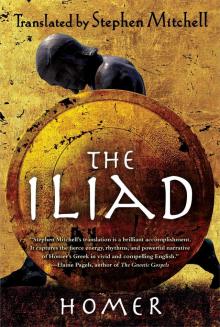 The Iliad
The Iliad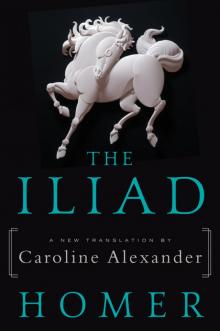 The Iliad (Trans. Caroline Alexander)
The Iliad (Trans. Caroline Alexander)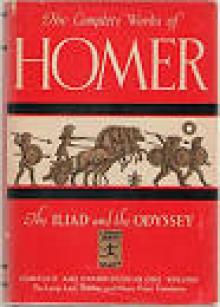 Complete Works of Homer
Complete Works of Homer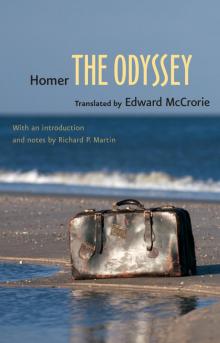 The <I>Odyssey</I>
The <I>Odyssey</I>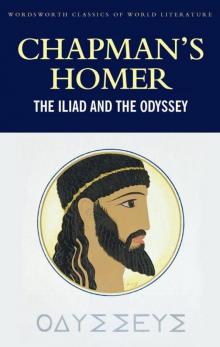 The Iliad and the Odyssey (Classics of World Literature)
The Iliad and the Odyssey (Classics of World Literature)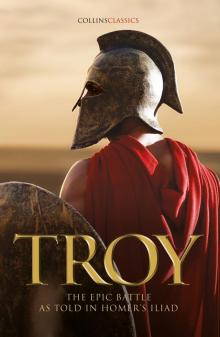 Troy
Troy The Iliad (Penguin Classics)
The Iliad (Penguin Classics) Delphi Poetry Anthology: The World's Greatest Poems (Delphi Poets Series Book 50)
Delphi Poetry Anthology: The World's Greatest Poems (Delphi Poets Series Book 50)